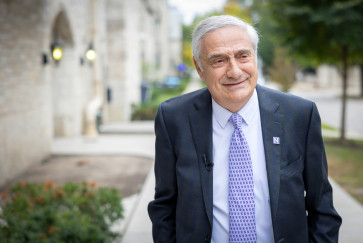“Duration dependence” is the term economists use to describe the idea that the longer you’re out of work, the less likely you are to find a job. Matt Notowidigdo, an associate professor of economics at Northwestern, investigates whether it is genuinely harder to find a job if you happen to be out of work for six months. Or, is something else going on?
Let’s consider Sarah and John, who both worked at the same nonprofit before they were laid off six months ago. Since then, Sarah has found a new job at another nonprofit. John has yet to land a new position.
“You know, every day that goes by makes it a little harder for you to get a new gig,” Sarah teases.
Is Sarah a little insensitive? Definitely. But is she right?
Research to date has shown that the longer a person is unemployed, the less likely they are to find work. But Notowidigdo cautions people against concluding, based on that research, that there is a causal effect – that the length of John’s unemployment is causing him to be out of work longer than Sarah. In other words, he’s not completely convinced that true “duration dependence” exists in the labor market.
If you’re comparing the people who found a job in month one with the people who are still unemployed at month eight, you’re not comparing the same person.”
economics professor
“The people who are motivated and have their lives in order, they are the kind of people who are going to find a job quickly,” he says. “There’s another kind of person who’s more likely to play video games. If you’re comparing the people who found a job in month one with the people who are still unemployed at month eight, you’re not comparing the same person.”
Maybe Sarah, who found a job in two weeks, had more time to fill out applications and travel to interviews than John, who has less time and money to travel. Or maybe Sarah had a friend who was looking to hire right away. There are myriad reasons, beyond duration of unemployment, that could explain the problem.
Personality differences and other factors, like free time, Notowidigdo says, muddy the waters of duration dependence by bringing in other possible explanations between the relationship between length of unemployment and a person’s ability to find work.
“There is an interaction between individual circumstances and duration dependence,” Notowidigdo says, adding that economists are hard pressed to draw conclusions from the data. “It’s challenging. You can’t tell someone to stay unemployed longer and see what happens to them.”
Notowidigdo and others have conducted research exploring this interaction and its impact on employers’ hiring decisions. You can read about Notowidigdo’s research on duration dependence at The New York Times.


